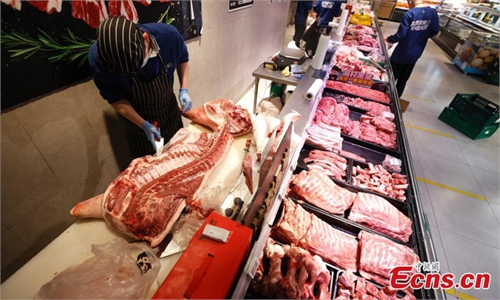
Pork products are seen at a Hema Fresh store in Chaoyang District, Beijing, April 26, 2022. (Photo: China News Service/Fu Tian)
Pork prices saw a continuous increase during China's National Day holidays from October 1 to 7, with the national average price rising nearly 2 yuan ($0.28) per kilogram, driven by consumption enthusiasm and the reduced market supply of hogs.Experts noted that the increase in pork prices since July this year is expected to continue to slightly drive up the year-on-year growth of the country's consumer price index (CPI), but with the end of holidays, the rise in prices will slow down.
As of 2 pm on Saturday, the average price of pork in the national agricultural wholesale market reached 32.81 yuan per kilogram, up 2.5 percent from the pre-holiday period (September 30), data released by the Ministry of Agriculture and Rural Affairs showed.
"Despite the impact of the epidemic, the consumption enthusiasm during the holidays still has a certain boosting effect on pork prices," Wang Zuli, deputy researcher at the Institute of Agricultural Economics and Development of the Chinese Academy of Agricultural Sciences, told the Global Times on Saturday.
Wang added that as previous price declines affected farmers' enthusiasm for breeding hogs, they tend to hoard stocks and seek to maximize profits with the approach of the two "consumption golden weeks," the New Year holiday and Chinese Spring Festival, which led to less supply in the market.
The prices of pork, a staple meat in the country, weigh on the CPI and Chinese people's livelihood. Since July this year, the prices saw a rapid growth, which contributed to the year-on-year rise of 2.5 percent of the CPI in August.
The increase in pork prices in September is expected to push up the year-on-year CPI by about 0.3 percentage points, Cong Yi, a professor at the Tianjin University of Finance and Economics, told the Global Times on Saturday, adding that, however, the price growth during the recent holidays will have a negligible impact on October's CPI.
"The hog price increase during the seven-day holidays is a transient phenomenon. After the National Day, hog prices are estimated to see slow growth with sufficient supply both from the central government and hog farmers," Wang noted.
On September 27, the National Development and Reform Commission (NDRC), the country's top economic planner, announced that China will release additional pork reserves into the market for the fourth time this year to ensure supply and maintain price stability.
The NDRC also suggested farms to reasonably arrange production and operation, maintaining the normal pace of slaughter and not blindly stocking up on hogs.
In addition to increasing release efforts into the market, the country can also increase pork imports to relieve domestic supply and demand pressure, Wang said.


